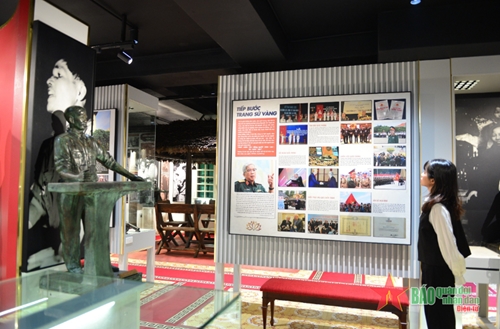Bring cultural heritage to public
One of the contents in the draft Law on Cultural Heritage (amended) that have received experts’ attention is encouraging the establishment of private museums. This content demonstrates the commitment to preserving, conserving, and promoting values of cultural heritage.
Bringing into play values of museums is an important concern of state management agencies. The Strategy for Development of Vietnamese Cultural Industries by 2020, with a vision towards 2030, sets the target to develop cultural tourism into a significant service economy. Missions and measures to develop cultural tourism also mention the need to strengthen museums. Museum-based tourism is considered the shortest path for visitors to have deeper understanding about the culture and history of each nation. Vietnam has also built many museums which are listed among the most attractive museums in Asia on world-renowned websites.
    |
 |
|
At General Nguyen Chi Thanh Museum |
Experts have been amazed by the increasing number of visitors to historical sites and museums in Hanoi. Changes in the look, operational forms, and approaches have attracted visitors.
More importantly, alongside public museums, private ones have gradually proved their important position in storing, preserving, and promoting values of artifacts. The presence of private museums is opening up a new trend and contributing to diversifying channels of popularizing values of cultural heritage.
Some notable private museums in Vietnam include Hoang Long Antique Museum, Bat Trang Museum, Museum of Revolutionary Prisoners, Vietnam Currency Museum, Lai Xa Photography Museum, World Coffee Museum, the Museum of Buddhist Culture, Muong Cultural Space Museum, Nguyen Van Huyen Museum, and General Nguyen Chi Thanh Museum, among others.
Limitation of artifact loss
Although most private museums have been established within the last decade, many of them have become preferred destinations for tourists. Many attractive cultural destinations are linked to these places.
According to the draft Law on Cultural Heritage (amended), private museums are regulated to be invested and operated by Vietnamese organizations, individuals, or foreign organizations and individuals who meet Vietnam’s requirement. In addition, the amended law also stipulates licensing conditions to encourage the operation of private museums. In particular, private museums must have collections on one or more themes, open to visitors, and have plans for organization and operation.
Many years ago, Assoc. Prof., Dr. Dang Van Bai predicted that the number of private museums in Vietnam would gradually increase and may surpass the number of public ones. This is not only a global development trend but also a favorable condition for the public to access the cultural heritage values of the nation. Achieving that goal requires the coordination between state management agencies and private museums.
The ideal approach would be combining major cultural events with private museums and mobilize resources from the public by calling on the donation of artifacts. In addition, private museums should consider gathering their collections and in turn organize thematic exhibitions to attract both domestic and international tourists.
According to experts' assessment, private museums are not short of attractive exhibits that demonstrate the diversity of the history and culture of the nation. With passion and financial resources, many private museums have leveraged the preservation and promotion of values of heritage.
Translated by Khanh Ly